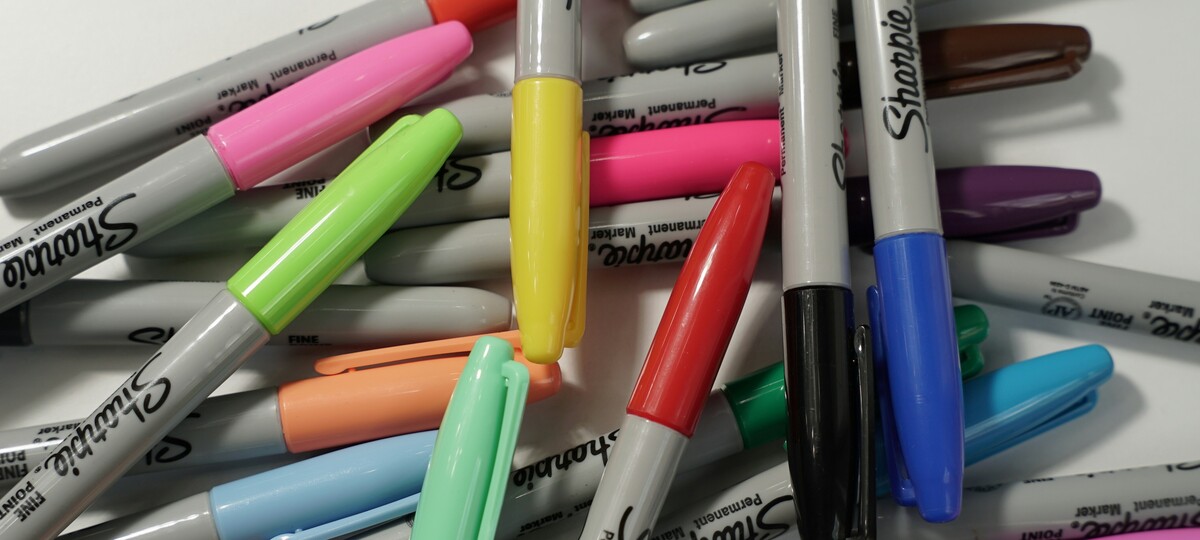Insight
Why Sharpies Are Made in America Again

President Donald Trump loves a Sharpie pen, and now he has all the more reason to love the company that makes them.
The president signed the flurry of executive orders he issued the day he returned to office with a Sharpie.
He's used them for years, finding them more reliable than fancier pens.
Now we know they have another merit, too: They're almost entirely made in America.
Only the felt tip of a Sharpie comes from abroad — it's made in Japan, according to the Wall Street Journal's Natasha Khan, who published an eye-opening article on the penmaker last week.
What makes Newell Brands, the corporation behind the Sharpie, so newsworthy is its success saving money — and holding down consumer prices — by making the pens in America.
Newell was once as dazzled as other manufacturers by the prospect of making its products more cheaply in Asia.
But in 2018, CFO Chris Peterson looked into producing the latest Sharpie, a gel version, at the company's factory in Maryville, Tennessee.
The new pen required updating the plant and training workers to operate and maintain the new machines.
Yet that's what made the project a triumph: investment, in an American factory and the Americans working there.
This country can make top-quality consumer goods at affordable prices, but only if companies invest in cutting-edge machinery and in enhancing workers' skills.
Peterson, who became the company's CEO, had Newell pay to send factory floor workers to college.
They came back ready to take on more technically demanding tasks, and naturally their wages shot up — on average by 50% over the last five years, in Peterson's estimation.
The mandarins of globalization say higher wages surely have to mean lower profits, and doesn't better machinery mean fewer workers?
But Newell's production costs dropped even as employment levels held steady:
Not every story in American manufacturing has such a happy outcome, but Newell proved the process that once lifted manufacturers and their workers together into prosperity still works in the 21st century.
Ford Motor Company famously discovered it could sell more cars by paying its workers well enough to afford the automobiles they were making.
Long before globalization, America's national economy boomed thanks to a virtuous cycle of rising wages, more technological investment, an increasingly educated workforce, and higher consumer spending on American-made goods.
Success at home led to success abroad: America was an exporting superpower that "ran persistent trade surpluses" from 1870 to 1970, the Federal Reserve Bank of St. Louis relates.
Trump wants to make American manufacturing great again.
But tariffs, which can help, are not enough by themselves.
The Sharpie case shows domestic investment is critical.
One reason for American manufacturing's relative decline in recent decades has been the high cost of building new plants or renovating old ones.
Even if it's profitable to manufacture in America, the upfront expenses are a hurdle, especially when foreign countries, which subsidize their industries in myriad ways, offer quicker returns on investment.
Trump incurred the wrath of free-market purists by getting government more involved in businesses like Intel and U.S. Steel.
Yet industries like chip-making and steel — or for that matter ship-building and aerospace — are sectors with heavy government involvement throughout the world.
The few countries that have significant manufacturing in those fields all use government aid to sustain their industries.
Even smart free-market economists are dangerously naive about this:
At a recent Dallas-area debate I participated in, National Review economics editor Dominic Pino (who's since moved to the Washington Post) contrasted "the government-driven protectionist model that we have used for U.S. Steel for decades," which has "now resulted in the quasi-nationalization of that company" with "FedEx, which is profitable, employs way more Americans ... and actually delivers services that Americans use every single day."
Trouble is, nowhere on earth is steel manufacturing as fully private an enterprise as FedEx is.
The choice Pino was presenting wasn't between government-backed steel or free-market steel — it was between partly government-backed steel or no domestic steel-making at all.
For most American manufacturers, private investment is enough — though even then, government must consider what unfair practices other countries may adopt to lure investment away from our shores.
There's also a role for government in ensuring a reasonably level playing field at home, so investment isn't incentivized out of manufacturing and into other sectors without the heavy upfront costs of plants and machinery.
Yet the Newell Brands example shows business leaders themselves can work miracles and defy globalization's laws of gravity when they put capital behind America's factories and workers.
(COMMENT, BELOW)
Previously:
• 09/30/25: Assata Shakur and Other Parents of Political Violence
• 09/09/25: Who's Accountable for Autopen Pardons?
• 09/02/25: Gender dysphoria is a mental-illness, NOT an all-encompassing delusion
• 08/26/25: Trump's Industrial Policy Is Realism, Not Socialism
• 08/19/25: Is Gavin Newsom the Dems' Answer to Trump?
• 08/12/25: Just Say No to More Marijuana
• 08/05/25: Will the GOP Make Libs Generous Again?
• 07/30/25: Trump's Trade Lesson for Economists (and the World)
• 07/22/25: Whose Politics Canceled Stephen Colbert?
• 07/08/25: A Big Beautiful Test of GOP Principles and Discipline
• 07/01/25: Dems Need Populism, But Not Zohran's Sort
• 06/25/25: Secure Borders Win Wars Like This One
• 06/18/25: WEIRD Protesters Should Stay Home
• 06/17/25: WEIRD Protesters Should Stay Home
• 06/04/25: State that's long eluded GOP turns toward Trump
• 05/21/24: Trump's Sun Belt Hopes and Rust Belt Needs
• 05/14/24: What Trump Sees in Doug Burgum
• 05/07/24: The Vietnam Era Never Ended for Biden's Party
• 05/06/24: Nationalists of the World, Unite?
• 04/25/24: Foreign Policy Splits
• 04/16/24: How pro-lifers stand to lose everything gained in overturning Roe
• 04/02/24: PBS Misremembers William F. Buckley Jr.
• 04/02/24: Who Wants to Be House Speaker?
• 03/26/24: Trump Hunts for a VP Close to Home
• 03/19/24: Princess Kate and Democracy's Discontents
• 03/12/24: Can Biden Buy the Voters?
• 03/05/24: Veepstakes Give Trump an Edge
• 02/20/24: Do Americans Trust Either Party?
• 02/13/24: Vladimir Putin -- A Passive Aggressor
• 01/23/24: Will 'Lawfare' Take Trump Off the Ballot?
• 01/16/24: Will Africa Save America?
• 01/09/24:'The Sopranos' at 25: A new world tragedy
• 01/02/24: Trump, Biden and a Fight for the Heart
• 12/12/23: What Happened to Ron DeSantis?
• 12/12/23: Biden Looks Doomed -- But Is He?
• 12/05/23: A Test for Trump and His Rivals
• 11/21/23: When Inequality Is Fatal for Men
• 11/14/23: Nevermind, The Battle's Over
• 11/07/23: War in the Dem Party -- and at the Opera
• 10/24/23: Israel's Lesson for 2024: A Lib Crackup
• 10/17/23: Libs' Dilemma: Immigration or Israel?
• 10/10/23: Why Bidenflation Defines Bidenomics
• 10/03/23: Will Gavin Newsom Copy Trump?
• 09/26/23: Biden's a Loser -- but Dems Can't Ditch Him
• 09/19/23: Do Sex Scandals Matter?
• 09/12/23: Cornel West Spells Doom for Biden
• 09/05/23: What Trump Does for Democracy
• 08/2/23: Ramaswamy: A Trump Versus Trump?
• 08/22/23: Take 'Rich Men North of Richmond' Seriously
• 08/16/23: How America Kills Its Own
• 08/08/23: The Biden Pardon That Can Spare America
• 08/01/23: Harding, a consevative for the ages
• 07/25/23: Demography Destiny, for Us and China
• 07/18/23: The Frontrunner Who Looks Like a Loser Is Biden
• 07/11/23: Britain's Bad Example for American Conservatives
• 07/05/23: Could We Still Win a Revolutionary War?
• 06/27/23: Civilizations Clash -- in Ukraine and at Home
• 06/20/23: China Comes for the Caribbean
• 06/13/23: Fertility, Family and Bio-Socialism
• 06/06/23: From American Dream to Orwell's Nightmare
• 05/23/23: Ukraine war is an existential struggle --- for the West
• 05/23/23: Learn the Right Midterm Lessons -- or Lose in 2024
• 05/16/23: Feinstein Today Is Biden Tomorrow
• 05/09/23: Trump, DeSantis and Political Courtship
• 05/02/23: RFK Jr.'s Threat to Biden
• 04/25/23: Biden's Lost Generation
• 04/25/23: Who's In Charge of Clarence Thomas?
• 04/11/23: Beyond AI, Our Cyborg Future
• 04/04/23: 2024: 3 Leaders, 1 Way to Win
• 03/28/23: Climate Science Makes a Bad Religion
• 03/21/23: All the Conspiracy That's Fit to Print


 Contact The Editor
Contact The Editor
 Articles By This Author
Articles By This Author